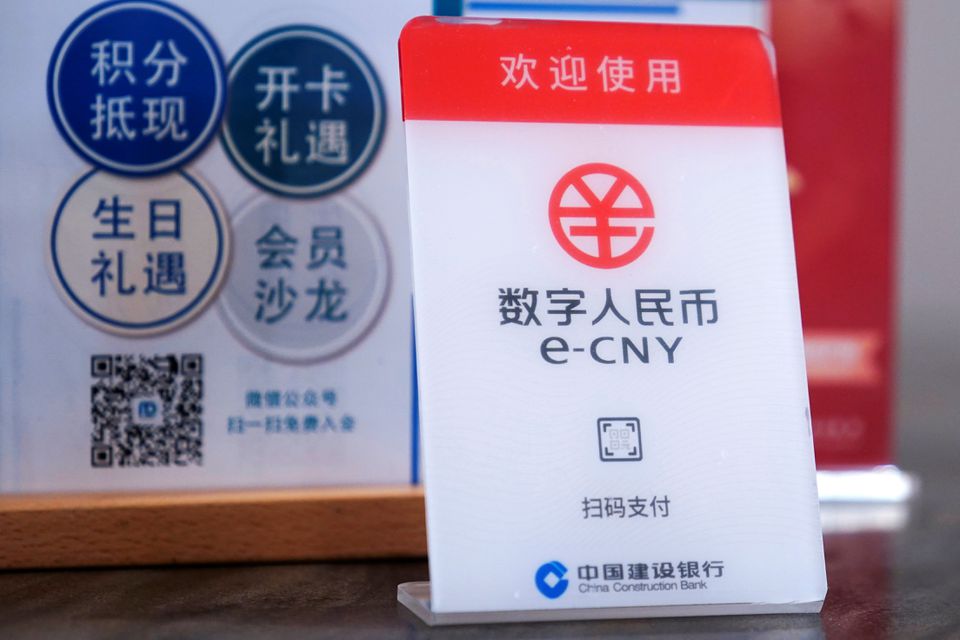
Story
Analyses show that China's digital currency trials pose a challenge to the duopoly of Alipay and WeChat.

Six major state banks in Shanghai are secretly promoting digital yuan ahead of a shopping festival on May 5, fulfilling a political mandate to provide customers with a payment option other than Alipay and WeChat Pay.
The banks are convincing merchant and retail clients to download digital wallets so that transactions can be made directly in digital yuan during the pilot program, bypassing the ubiquitous payment plumbing laid by tech giants Ant Group, an affiliate of Alibaba 9988.HK, and Tencent 0700.HK.
"People will realise that digital yuan payment is so convenient that I don't have to rely on Alipay or WeChat Pay anymore," said a bank official involved in the rollout of e-CNY for the Shanghai trial, under the guidance of China's central bank. The official refused to be named because he or she is not authorized to communicate with the media.
The launch of a sovereign digital currency in China, which is well ahead of similar initiatives in other major economies, appears to be eroding Ant Group's Alipay and Tencent's WeChat Pay's supremacy in online payments.
This encroachment coincides with Beijing's the effort to curb anticompetitive behavior in the internet sector, as part of a broader effort to rein in the sector's clout.
Ant's record $37 billion IPO was canceled by regulators in November, and the fintech conglomerate owned by Jack Ma was forced to undergo a sweeping restructuring earlier this month. Alibaba Group Holdings, Ma's company, was recently fined a record $2.8 billion for antitrust violations.
The People's Bank of China (PBOC) has stated publicly that e-CNY will not compete with AliPay or WeChat Pay, and will only act as a "backup" or "redundancy." (Read the rest of the story)
However, state banks selling the central bank's digital fiat currency openly describe Beijing's plan to challenge the duo's dominance.
"Big data is wealth. Whoever owns data thrives," said another banking official tasked with promoting the e-CNY.
"WeChat Pay and Alipay own an ocean of data," he said, adding that the e-CNY rollout aids China's anti-trust campaign and lets the government monitor big data.
Requests for comment from the PBOC and Tencent were not returned.
Ant refused to comment on Alipay's partnership with e-CNY.
Ant-backed MYbank said it is "one of the parties participating in the research and development" of the e-CNY, and "will steadily advance the trial pursuant to the overall arrangement of the People's Bank of China."
DIGITAL CASH
Last year, the e-CNY, which digitalizes a portion of China's physical notes and coins, or currency in circulation (M0), was introduced in four cities as a small pilot scheme.
The PBOC issues digital currency to banks, which then distribute it to individuals and businesses through a two-tier distribution structure.
China's largest lenders, including Industrial and Commercial Bank of China, Agricultural Bank of China, Bank of China, and China Construction Bank, are among the six banks participating in the e-CNY pilot schemes.
"The e-CNY's ease of use will likely be comparable to Alipay and WeChat Pay, while its security function will likely be higher, and as sophisticated as Bitcoin," HSBC wrote in a recent report, adding that it expects the digital currency to "proliferate" within China.
The central bank's intention to gain control of payment networks and consumption data from Alipay and WeChat Pay is one of many possible reasons cited by HSBC.
SUSPICIOUSLY MISSING
Digital wallets can be bundled with a dozen common apps, including Meituan, JD.com, Didi, and Bilibili, but not with WeChat or Alipay, which is still in beta testing. That means no e-CNY can be transferred between participating banks' digital wallets and the two existing payment platforms.
"PBOC doesn't want to see the money being routed through third-party payment systems," a banker said, citing the need for "information segregation".
According to Wilson Chow, Global TMT Chief, PwC China, the e-CNY will digitize "the last mile" of consumption, allowing banks and merchants to collect data and gain insights into buying habits.
Alipay and WeChat Pay, which together control 94 percent of China's online payment industry, now dominate this data.
The e-widespread CNY's adoption will take time.
In a few years, Chow estimates that e-CNY will account for roughly 10% of China's electronic payments industry, coexisting with Alipay and WeChat Pay.
To entice consumers, bankers predict that the PBOC will hand out "red envelopes" containing free digital cash or discounts to Shanghai residents during the upcoming shopping festival, an event aimed at encouraging spending to help the city recover from COVID-19.
Domestic adoption will come first, according to PBOC deputy governor Li Bo, before cross-border payments with e-CNY, which many analysts expect will boost the yuan's global standing as China tries to eventually crack the dollar settlement system's supremacy.
"The priority of the yuan's digitalization is currently to promote its domestic use," Li said.
